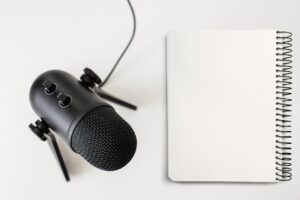Whether you’re just starting out or an experienced podcaster already, crafting up the perfect podcast script can feel like you’re solving a mystery. Where do you even begin in this process? What information should I include? Should I use humor?
Don’t worry, we’ll share with you some tips and tricks on how to write powerful scripts for your podcast episodes and how to structure them for maximum engagement. Let’s jump right in!
What is a Podcast Script?
Having a script is essential to keeping your podcast organized and improving ROI.
A podcast script is a blueprint for what your episode will sound like, so it lays out all the details – from structure and sound to tone and transitions. It can also help prevent any awkward pauses or tangents that could disrupt the flow of the show.
Creating a script ensures that each episode is well-crafted and targeted specifically toward your audience. It also helps you avoid any topics that would be off-brand for your show. Lastly, scripting allows you to make sure each episode runs for the right length – too long or too short can reduce engagement and interaction with listeners.
Why You Need to Script Your Podcast Episodes

When it comes to creating and recording a podcast episode, scripting is key. Think of it like the skeleton that you can then build onto for your episode. Without a script, you’ll likely end up with choppy narration that might lack impact.
So what can you gain from scripting? Here are just a few of the advantages:
Clarity
With scripting, you’ll have a clear idea of what points you want to make so they can be presented in an organized way.
Consistency
Scripting allows for more consistency throughout your podcast episodes—you can ensure each episode follows the same structure and topics without getting off track.
Credibility
A well-written and well-structured script gives your podcast an extra layer of credibility. Plus, when listeners hear an organized episode they’ll be much more inclined to continue tuning in.
Improved Delivery
Scripts enable you to practice and refine your delivery. When you know what you’re going to say and how you’re going to say it, you can work on your pacing, intonation, and overall presentation, resulting in a more polished and professional performance.
Tips for writing podcast scripts
Writing good podcast scripts can be a challenge, but there are a few tips you can keep in mind to help you get the most out of your script and create a more powerful podcast. There are various kinds of scripts and the way you write a script varies from one type of script to another. So, here are some tips to help you get through the process:
Solo Show Podcast script

Outline your episode
Before diving into writing the script, create a clear outline of your episode’s structure. Break it down into sections, such as an introduction, main points, examples, stories, and a conclusion. This will give you a roadmap to follow while writing.
Grab attention with a strong intro
Start your episode with a compelling hook to grab your listeners’ attention right from the beginning. You can use an intriguing question, an interesting fact, a relatable story, or a thought-provoking statement to captivate your audience.
Use conversational language
Write your script in a conversational tone to make it feel more engaging and relatable. Imagine you’re having a friendly conversation with your listeners, and using language that feels natural and authentic. Avoid overly formal or technical jargon unless it’s necessary for your topic.
Keep it concise and focused
Solo podcasts have the advantage of allowing you to express your thoughts without interruptions. Avoid rambling or going off on tangents. Stick to your main points and deliver them clearly. Certain mistakes and ah & ahm can be removed during post-production, but best to avoid them during recording as much as possible.
Use storytelling techniques
Storytelling can be a powerful tool to captivate your audience and make your content more memorable. Incorporate relevant stories, anecdotes, or examples that illustrate your points and keep your listeners engaged throughout the episode.
Interview Show Podcast script

Research your guest
Before the interview, thoroughly research your guest. Learn about their background, achievements, and expertise. This will help you ask informed and thoughtful questions that will elicit interesting responses. Have an informal conversation before going into recording. This will help ease the flow of the conversation during the main recordings.
Define a clear structure
Plan the structure of your podcast episode. Decide on the main topics or themes you want to cover and create a logical flow for the conversation. This will help you stay organized and ensure a smooth progression of ideas.
Prepare a list of questions
Develop a list of questions based on your research. Start with broad, open-ended questions to encourage detailed answers. However, be flexible during the interview and allow room for spontaneous discussion. You can also share the list of questions with your guests beforehand so they can come prepared for the recording.
Maintain a conversational tone
Keep the interview conversational and natural. Avoid sounding overly scripted or rigid. Make your guest feel comfortable and encourage them to share their insights and experiences.
Co-Host Show Podcast script

Assign roles and responsibilities
Determine the roles and responsibilities of each co-host. Assigning roles can help ensure a balanced conversation and allow each host to bring their unique perspective to the table.
Collaboratively brainstorm discussion points
Work together with your co-host to generate a list of discussion points, questions, or key takeaways for each segment. Consider the different angles or viewpoints you can explore to provide a diverse and engaging conversation.
Create space for spontaneous conversation
While it’s important to have a script, leave room for spontaneous conversation and improvisation. Some of the most interesting moments in a co-host show podcast come from unplanned exchanges.
Allocate talking time
Coordinate the speaking time between co-hosts to ensure balanced participation. Be mindful of not dominating the conversation or allowing one host to monopolize the discussion.
Elements of a good podcast script
We know you’re raring to get scripting, so let’s get into it! A good script is always made up of a few key components.

Story Development
When scripting your podcast episode, it helps to plan out the content beforehand. This makes sure that you don’t leave out any important details and have a definite plan of attack from the get-go. Jot down every idea that comes to you and decide which ones fit into your overall story narrative.
An Engaging Introduction
Once you know what route you want your episode to take, an introduction is the best way to capture your audience’s attention right away! Start by introducing yourself or your topic with an interesting fact or anecdote. This will help keep your audience captivated and serve as a guide for the rest of the episode.
Sounds & Music
When creating a script, try to incorporate sound effects and music throughout the episode to enhance the story. When writing in sound cues for your script, make sure not to forget about copyright laws; seek out royalty-free music to use as background music or use free sound effects libraries where possible.
Some websites like Pixabay (https://pixabay.com/music) and Pixabay (https://pixabay.com/music) provide you with free royalty-free music to add to your podcasts. You can also use Hubhopper’s audio library which provides you with a variety of options to choose from. Note that the option is available only on the Hubhopper app.
Consistent Content Formatting
To keep things organized, structure each segment with bullet points so it’s easier for you to follow along as you read out each line from the script. It also helps if you indicate different elements in the script like dialog, transitions, and sound effects with proper formatting symbols.
Call to Action ( CTA )
By including a CTA at the end of each episode, you provide a clear direction to your listeners, guiding them on the next steps to take after listening to your episode. It helps create a sense of purpose and prompts them to engage further with your podcast and brand.
Start with introducing your CTA, then highlight the benefits your audience will gain by following the CTA, provide clear instructions about the same, and conclude with gratitude to the audience for their time and support.
Time Coding
It’s important to make sure that each part of your episode runs on time so that you finish within the prescribed timeframe. Make it easier for yourself by adding time cues or adding voiceovers between each section to prevent any delays or timing issues later on!
Conclusion
So, to wrap it up, scripting and structuring your podcast is a crucial part of creating a successful podcast. You want to make sure that you take the time to craft engaging scripts that will captivate your listeners. Structure those scripts with elements that will keep your audience engaged, and make sure you keep it simple. It can often take some tweaking and trial and error, but it’s worth it in the end.
Then, when you’re done, look for a platform that can host and distribute your podcast to different platforms. Finding a service like Hubhopper that assists you with the editing, publishing, and distribution of your podcast will take away most of the stress and headaches of the entire podcasting process. So, give Hubhopper a try, and see how easy it makes podcasting.
Happy Podcasting!





